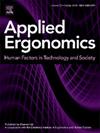Developing predictive models of user affective responses and a grading system for evaluating multi-crease patterns in foldable smartphones
IF 3.1
2区 工程技术
Q2 ENGINEERING, INDUSTRIAL
引用次数: 0
Abstract
This study investigated the user affective (Kansei) evaluation of foldable smartphone creases. Twenty-five participants assessed twenty foldable smartphone display prototypes with various multi-crease patterns, for four affective dimensions (crease invisibility, flawlessness, luxuriousness and harmoniousness) using an 11-point rating scale, and, for overall goodness using a 7-point adjective-anchored scale. The adjectives for overall goodness evaluation represented different crease grade categories. Principal component analysis identified a composite measure, termed Affective Quality Score (AQS), which integrates the four affective dimensions. A regression model was developed to predict AQS based on physical features of a multi-crease pattern. Also, a crease grading system was established that determines the adjective grade category of a multi-crease pattern using its AQS. The regression model along with the crease grading system enables predicting and grading the affective quality of a given multi-crease pattern. The research outcomes would support design goal setting and continuous quality improvement for foldable smartphone products.
开发用户情感反应的预测模型和用于评估可折叠智能手机中多折痕图案的分级系统。
本研究调查了可折叠智能手机折痕的用户情感(感性)评价。25名参与者评估了20个可折叠智能手机显示屏原型,它们具有不同的多折痕图案,四个情感维度(折痕不可见性、完美性、奢华性和和谐性)采用11分的评分标准,整体良好度采用7分的形容词固定评分标准。综合优度评价的形容词代表了不同的折痕等级类别。主成分分析确定了一个复合测量,称为情感质量评分(AQS),它整合了四个情感维度。建立了基于多折痕图物理特征的AQS预测回归模型。建立了折痕分级系统,利用其AQS系统确定多折痕图的形容词等级类别。该回归模型以及折痕分级系统能够预测和分级给定多折痕图的情感质量。研究成果将为可折叠智能手机产品的设计目标设定和持续质量改进提供支持。
本文章由计算机程序翻译,如有差异,请以英文原文为准。
求助全文
约1分钟内获得全文
求助全文
来源期刊

Applied Ergonomics
工程技术-工程:工业
CiteScore
7.50
自引率
9.40%
发文量
248
审稿时长
53 days
期刊介绍:
Applied Ergonomics is aimed at ergonomists and all those interested in applying ergonomics/human factors in the design, planning and management of technical and social systems at work or leisure. Readership is truly international with subscribers in over 50 countries. Professionals for whom Applied Ergonomics is of interest include: ergonomists, designers, industrial engineers, health and safety specialists, systems engineers, design engineers, organizational psychologists, occupational health specialists and human-computer interaction specialists.
 求助内容:
求助内容: 应助结果提醒方式:
应助结果提醒方式:


